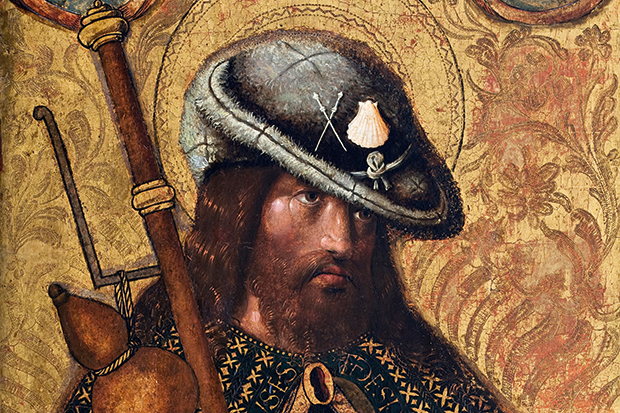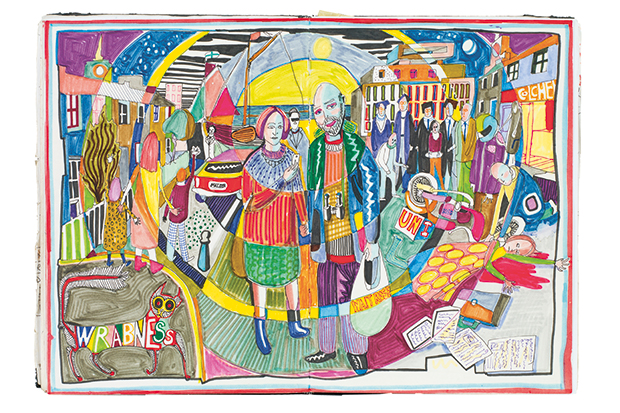Nicola Barker is both prodigiously talented and admirably fearless. I have loved her books. But for some time I had little or no idea what the point of the story of Sri Ramakrishna was. In fact he was one of the outstanding men of 19th-century India. Characteristically of Barker, the narrative of her latest book is interlaced with little jokes and haikus and sly references to contemporary language and manners. (There is even an excursion to the Camargue.) At first I found the whole enterprise repetitive and wilfully quixotic, but it is well worth persevering.
Barker describes her book as ‘truly little more than the sum of its many parts’. It turns out to be far more than that; a freehand, jokey sort of spiritual journey, an admiration and a parody of faith, orchestrated by Barker with an unfailing eye for the comic opportunity. She is not a practising Hindu, but she is fascinated by the phenomenon of faith, which is so pervasive in India. The bibliography helps enormously in understanding how Barker has made this complex, funny book. At one time in the narrative someone — perhaps Barker — is making a film. When she looks back at the processed film there is not a single image to be seen. I have no idea what this signifies. The Cauliflower® is not strictly a novel, as Barker says in her indispensable afterword.
I read gamely on, struggling with the story about Rani, about Uncle, about Pratap Chandra Hazra and Hriday and Sri Ramakrishna, which involved endless accounts of meals and feuds and spiritual achievements and rivalries and all manner of illnesses and trances. Then I discovered Barker’s afterword. I recommend reading this first, in order to orientate yourself in very dense and whimsical territory. You will learn that Barker, born in South Africa, has been obsessed all her life with Sri Ramakrishna — unusual for a girl from Johannesburg.
In his later years Ramakrishna took up residence at the Dakshineswar Kali Temple, from where his radiance extended far, even beyond his death in 1886. His last days are movingly described:
The guru begins to move among them, barely conscious, touching them, one after another, with his outstretched fingers. Each person responds differently to the Master’s touch, because each person is different; and he will give them only what he thinks will send them forward on their spiritual journey. Some begin praying, some speak imaginary languages, some start to sing. Some fall to the ground, their bodies contorting, some are silent, unable to speak, some wait and weep, some sit quietly and meditate, some dance, some whir around and scream.
The most important of the chroniclers of his life was Hriday; he served Ramakrishna for 12 years, doing menial duties for which he received little recognition or kindness. He was made a priest at Chandra Datta’s Garden House, but he was soon sacked for eating the Master’s butter and offering his own inferior food to Chandra Datta. Hriday was a difficult man, but he also provided the biography of Ramakrishna which was to become the Gospel of Sri Ramakrishna.
The Cauliflower® is full of these bizarre anecdotes, some of them petty, others moving or whimsical, as its many characters try to make sense of the universe in which they live — a universe strange, febrile and utterly unique. I don’t think Nicola Barker has quite pulled this one off, but it is a story packed with vitality, wit, sly charm and astonishing energy.
Got something to add? Join the discussion and comment below.
Get 10 issues for just $10
Subscribe to The Spectator Australia today for the next 10 magazine issues, plus full online access, for just $10.
Available from the Spectator Bookshop, £13.99. Tel: 08430 600033. Justin Cartwright’s novels include Leading the Cheers, In Every Face I Meet and most recently Up Against the Night.
You might disagree with half of it, but you’ll enjoy reading all of it. Try your first month for free, then just $2 a week for the remainder of your first year.














Comments
Don't miss out
Join the conversation with other Spectator Australia readers. Subscribe to leave a comment.
SUBSCRIBEAlready a subscriber? Log in